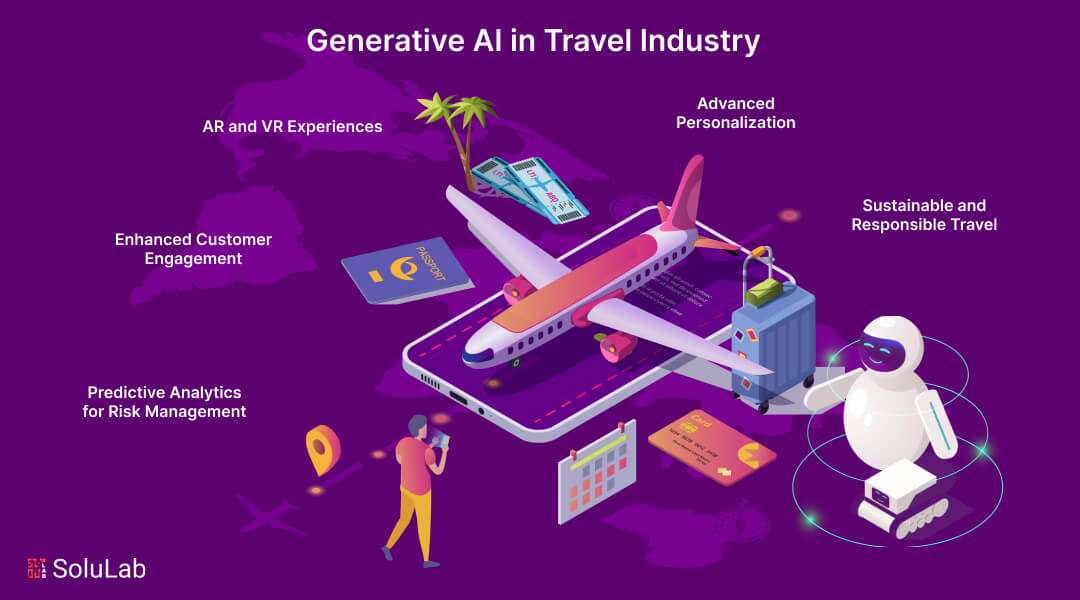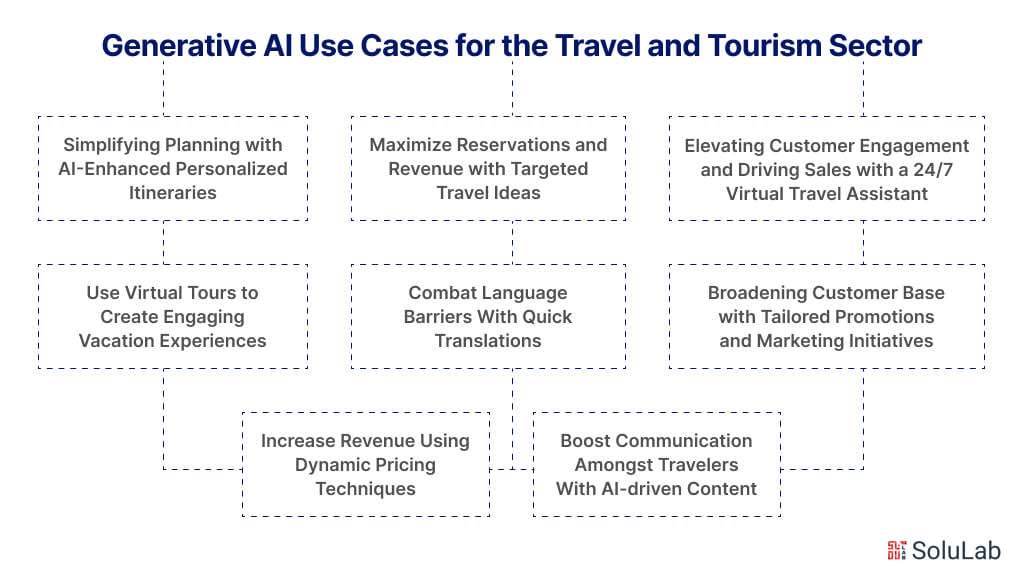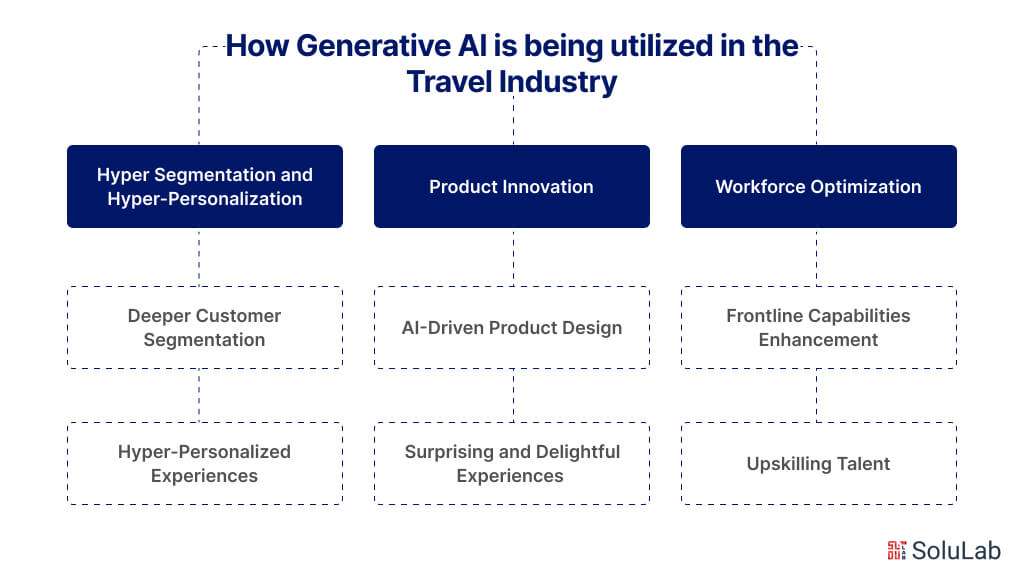
Generative AI is the travel industry’s magical wand, customizing journeys like never before. From recommending hidden treasures to creating one-of-a-kind itineraries, its algorithms understand and customize your tastes. Generative AI in travel acts as a digital concierge, intuitively understanding travelers’ preferences and crafting experiences that exceed expectations, making every trip an adventure worth remembering. This blog article covers the ways in which Generative AI is giving the travel sector a facelift.
How is Generative AI Applied in the Travel and Hospitality Industry?
Generative AI uses algorithms that process natural language to generate text or graphics based on basic instructions. Many Generative AI platforms use economies of scale to generate material fast, including email subject lines and social media posts. In recent years, the travel and hospitality industry has witnessed a surge in the adoption of Generative AI technologies, driven by the increasing demand for personalized and immersive travel experiences. According to a report by Allied Market Research, the global AI in travel market is projected to reach $9.46 billion by 2025, growing at a compound annual growth rate (CAGR) of 35.4% from 2018 to 2025. This exponential growth is fueled by the rising preference for customized travel itineraries, coupled with advancements in AI algorithms that enable more accurate and tailored recommendations for travelers.
One of the key areas where Generative AI has made a significant impact is in personalized recommendations, with studies showing that 85% of travelers are more likely to book with travel brands that offer personalized experiences. By leveraging data analytics and machine learning algorithms, travel companies can analyze vast amounts of traveler data, including past booking history, preferences, and social media interactions, to deliver highly personalized recommendations for accommodations, activities, and destinations. This not only enhances the overall travel experience for customers but also drives customer loyalty and increases revenue for businesses. Furthermore, Generative AI is increasingly being utilized to optimize pricing strategies and forecast demand, with studies indicating that AI-driven revenue management systems can increase hotel revenue by up to 10% and improve profit margins by 2% to 5%.
Generative AI Use Cases for the Travel and Tourism Sector

The most common use cases of Generative AI in travel include personalized travel suggestions, flexible advertising, itinerary personalization, AI-powered booking assistants, customer assistance, dynamic tour pricing, and guided tours.
1. Maximize Reservations and Revenue with Targeted Travel Ideas
Maximizing reservations and revenue with targeted travel ideas involves advanced AI technology applying rules-based Machine Learning [ML] algorithms to analyze vast customer information like past bookings, demographics, browsing behavior, and social media usage. This allows travel companies to identify unique vacationing patterns and preferences, enabling them to suggest holiday destinations, activities, and itineraries that resonate more with individual customers. For example, if a consumer consistently expresses interest in eco-friendly lodging near beaches, Generative AI can recommend suitable coastal locations that are well-known for their sustainable tourism activities.
The impact of personalized recommendations for travel companies is significant: Customers feel their preferences are understood and catered to, increasing the likelihood of completing a booking and resulting in higher conversions. Tailored suggestions optimize a customer’s journey, making it more unique and valuable, thus fostering a positive brand perception and engagement during the search and booking process. By consistently delivering relevant experiences, travel companies can build strong emotional connections with customers, increasing the likelihood of repeat business for future holiday plans.
Read Blog: How AI is Changing the Tourism & Travel Industry?
2. Simplifying Planning with AI-Enhanced Personalized Itineraries
Today’s travelers seek more than cookie-cutter itineraries; they desire bespoke plans tailored to their unique interests and preferences. Generative AI addresses this demand by crafting dynamic itineraries that consider various factors aligned with individual customer preferences, such as optimal travel routes, accommodation options, activities, and local transportation solutions.
Generative AI for travel creates personalized itineraries by analyzing factors like optimal flight connections, accommodation preferences, desired activities, and local transportation options. This ensures that the itinerary is not only customized to the traveler’s preferences but also optimized for efficiency and convenience. Additionally, AI technology can enhance the itinerary with recommendations for local dishes to try, language tips, and cultural etiquette, providing travelers with a comprehensive and personalized travel experience. AI-driven itineraries provide a means for travel firms to enhance productivity while also improving consumer experience. More crucially, they can deliver highly tailored services on a large scale, which would be extremely resource-costly without AI.
3. Elevating Customer Engagement and Driving Sales with a 24/7 Virtual Travel Assistant
In the travel and tourism industry, the utilization of Generative AI-powered virtual travel assistants has emerged as a game-changer in enhancing customer engagement and boosting sales. Research indicates that a significant 87% of customers express willingness to interact with such virtual assistants to streamline their travel arrangements, thus saving both time and money. These AI-driven travel chatbots use generative AI in travel and tourism and offer a plethora of benefits, including suggesting personalized tour packages tailored to individual preferences, behavior, and budget constraints.
Moreover, virtual travel assistants excel in upselling additional services such as in-destination activities and transportation arrangements, thereby generating additional revenue streams for travel companies. Notably, these AI assistants operate round-the-clock, eliminating the need for travel companies to employ live agents continuously. They efficiently handle queries of varying complexity, promptly escalating more intricate issues to customer service teams, thus enhancing overall case-solving efficiency. Furthermore, their multilingual capabilities enable them to engage with multiple customers simultaneously across different languages, expanding the reach of travel companies to a broader global audience. These virtual assistants seamlessly manage bookings at scale, facilitate modifications to existing reservations, and provide real-time updates on flight timings, thereby offering unparalleled convenience and efficiency to travelers.
4. Broadening Customer Base with Tailored Promotions and Marketing Initiatives
Leveraging the capabilities of Generative AI in Travel & Hospitality, companies can strategically increase their customer base through targeted offers and marketing campaigns tailored to individual preferences.
Generative AI for travel algorithms analyzes extensive datasets, including past bookings, search histories, and interaction frequencies, to construct detailed customer profiles encompassing preferences for destinations, activities, travel dates, accommodation types, and budget considerations. Armed with this insightful data, travel companies can craft personalized offers and holiday recommendations that resonate with each customer, increasing the likelihood of engagement and conversion.
For instance, for frequent business travelers, Generative AI can identify patterns such as long layovers and recommend complimentary or discounted lounge access as part of their booking, thereby enhancing the overall travel experience and driving greater revenues. Similarly, solo travelers inclined towards adventure activities can be enticed with personalized upgrades to VIP adventure packages, featuring exclusive experiences like private hot air balloon rides. This personalized approach not only increases the average booking value but also fosters repeat business.
5. Combat Language Barriers With Quick Translations
Instant translation apps and chatbots are revolutionizing travel experiences in non-English speaking countries. Whether in bustling Tokyo, picturesque Seoul, romantic Paris, or vibrant Hanoi, language barriers dissolve with the tap of a screen.
These innovative tools empower travelers to effortlessly navigate foreign locales. Asking for directions, deciphering signs, or understanding local customs becomes a breeze. With real-time translation capabilities, users can input queries or upload images, receiving instant translations that bridge linguistic gaps.
Furthermore, chatbots stand ready to assist with bookings, answer FAQs, and offer support, catering to individuals of all language proficiencies. Through the power of Generative AI, accessibility in travel is enhanced, ensuring memorable and stress-free adventures for every globetrotter.
6. Increase Revenue Using Dynamic Pricing Techniques
Dynamic pricing, powered by advanced AI algorithms, is revolutionizing the travel industry by offering dynamic and personalized pricing strategies. This approach analyzes various factors such as market dynamics, supply, and demand, as well as external variables like weather and local events to optimize pricing in real-time. Here’s how travel companies can benefit from implementing dynamic pricing:
- Increased Bookings: By adjusting prices dynamically based on demand and other factors, travel companies can maximize occupancy rates for flights and hotels. This ensures that they capture more bookings at optimal price points, leading to higher revenues.
- Competitive Advantage: With access to real-time data, travel companies can stay competitive by adjusting their rates dynamically. This allows them to ensure that their services are neither overpriced nor underpriced compared to competitors, thereby maintaining their market positioning.
- Enhanced Customer Satisfaction: Dynamic pricing enables travel companies to offer better deals to customers, especially during off-peak times. By strategically lowering prices when demand is low, companies can attract more customers and improve overall customer satisfaction.
- Adaptability: Dynamic pricing strategies are adaptable to changing market conditions and customer preferences. This flexibility allows travel companies to respond quickly to fluctuations in demand, ensuring that their pricing remains relevant and attractive to customers.
7. Boost Communication Amongst Travelers With AI-driven Content
In today’s travel industry, the power of words and visuals cannot be underestimated. Generative AI tools like DALL·E and Sora have revolutionized content creation, offering travel companies innovative ways to showcase destinations and inspire potential travelers.
These AI technologies enable the creation of high-quality images and videos that provide virtual glimpses into travel experiences. Whether used in social media campaigns or website content, these visuals play a crucial role in attracting audiences. Additionally, AI can craft captivating narratives about destinations, incorporating historical facts and local anecdotes to enrich blogs, brochures, and advertisements.
Furthermore, AI-generated audio adds another dimension to the travel experience, immersing potential travelers in the sounds of bustling markets or serene beachscapes. By leveraging Generative AI, travel companies can produce diverse content formats quickly and cost-effectively, catering to various audiences and languages. This not only enhances customer engagement but also increases the likelihood of converting leads into bookings, ultimately driving revenue growth.
8. Use Virtual Tours to Create Engaging Vacation Experiences
Travelers are becoming more involved with the Metaverse, according to a Booking.com report. 46% of respondents to a survey on virtual reality (VR) concur that after using VR, they are more willing to visit new places.
Utilizing photos, videos, and other data inputs, travel agencies may leverage virtual tours as an effective marketing tool to highlight the possibilities of their products since Generative AI can create realistic and detailed visuals, sounds, and even 3D models of locations.
They can increase potential clients’ trust and confidence, which lowers reservation hesitancy and raises satisfaction levels. Travel agencies can also provide personalized itineraries that emphasize experiences and sights that are especially meaningful to the traveler, strengthening their bond with the place.
How is Generative AI in the Travel Industry Being Utilized to Improve Business Operations?

Generative AI is revolutionizing the way businesses operate in the travel industry, enabling them to optimize various aspects of their operations for better efficiency, customer satisfaction, and innovation. Here’s a more detailed elaboration on how generative AI is being utilized:
1. Hyper Segmentation and Hyper-Personalization
- Deeper Customer Segmentation: Generative AI allows travel companies to analyze vast amounts of customer data to create highly refined and granular customer segments. Instead of broadly categorizing customers into groups like business or leisure travelers, businesses can now create hyper-segments tailored to individual preferences, behaviors, and demographics.
- Hyper-Personalized Experiences: With these hyper-segments in place, businesses can implement hyper-personalization strategies, tailoring every interaction to each customer’s unique needs and preferences. This level of personalization extends across the entire customer journey, from personalized recommendations for destinations and activities to customized pricing and promotions. By leveraging generative AI algorithms, businesses can deliver experiences that resonate deeply with each individual customer, fostering stronger engagement and loyalty.
2. Product Innovation
- AI-Driven Product Design: Generative AI tools like ChatGPT are inspiring a new era of product innovation in the travel industry. By harnessing the power of AI and digitization, businesses can reimagine their products and services, designing offerings that go beyond traditional boundaries.
- Surprising and Delightful Experiences: Through the integration of generative AI, travel companies can create products that surprise and delight customers. These AI-driven solutions have the potential to anticipate customer needs, deliver personalized recommendations, and offer unique experiences that exceed expectations. By leveraging AI for product innovation, businesses can differentiate themselves in a crowded market and foster deeper connections with their customers.
3. Workforce Optimization
- Frontline Capabilities Enhancement: Generative AI technologies empower frontline staff with tools and insights to enhance their decision-making capabilities. By providing real-time data analysis, predictive analytics, and a personalized recommendations system, AI assists frontline employees in delivering exceptional customer service and resolving issues efficiently.
- Upskilling Talent: Businesses are investing in upskilling their workforce to leverage generative AI effectively. Training programs and workshops enable employees to harness the capabilities of AI tools, improving their efficiency, productivity, and job satisfaction. By merging human expertise with AI-driven insights, businesses can optimize workforce performance and operational efficiency, driving better outcomes for both employees and customers.
Future of Generative AI in Transforming the Travel Industry
The future of generative AI holds immense promise in further transforming the travel industry, ushering in a new era of innovation, personalization, and efficiency. Here’s a glimpse into what lies ahead:
- Advanced Personalization: As generative AI algorithms become more sophisticated, they will enable even deeper levels of personalization in the travel experience. By continuously analyzing vast amounts of data, including historical interactions, real-time behaviors, and even biometric indicators, AI systems will be able to anticipate travelers’ needs and preferences with unprecedented accuracy. This level of personalization will extend beyond trip planning to every aspect of the journey, from customized in-flight entertainment options to tailored recommendations for local experiences.
- Enhanced Customer Engagement: Generative AI will play a crucial role in enhancing customer engagement throughout the travel lifecycle. AI-driven chatbots and virtual assistants will become even more intuitive and conversational, providing travelers with instant assistance and personalized recommendations in natural language. These AI interfaces will not only streamline the booking process but also serve as trusted companions during the journey, offering real-time updates, local insights, and personalized suggestions based on individual preferences.
- Augmented Reality (AR) and Virtual Reality (VR) Experiences: Generative AI will intersect with AR and VR technologies to create immersive and interactive travel experiences. Through AI-powered virtual assistants, travelers will be able to explore destinations in virtual environments, preview accommodations in 3D, and even simulate activities before making reservations. These immersive experiences will not only enhance trip planning but also allow travelers to preview and personalize their itineraries with unprecedented realism.
- Predictive Analytics for Risk Management: Generative AI will enable travel companies to leverage predictive analytics for proactive risk management and crisis response. By analyzing historical data, social media trends, and global events in real time, AI systems will be able to identify potential risks and disruptions before they occur. This proactive approach will empower travel companies to implement preemptive measures, reroute itineraries, and communicate with travelers effectively during emergencies, enhancing safety and peace of mind.
- Sustainable and Responsible Travel: Generative AI will support the growing trend towards sustainable and responsible travel practices. By analyzing environmental data, carbon footprints, and traveler preferences, AI systems will help businesses optimize their operations for sustainability. From recommending eco-friendly accommodations to promoting responsible tourism activities, AI-driven initiatives will encourage travelers to make environmentally conscious choices, contributing to a more sustainable future for the travel industry.
Thus, the future of generative AI in the travel industry is one of boundless possibilities. As AI technologies continue to evolve and mature, they will revolutionize every aspect of the travel experience, from personalization and engagement to risk management and sustainability. By embracing these advancements, travel companies can stay ahead of the curve, delivering unforgettable experiences that resonate with travelers in the digital age.
Concluding Remarks
In conclusion, the role of generative AI in transforming the travel industry cannot be overstated. From hyper-personalized recommendations and seamless customer experiences to predictive analytics for risk management and sustainable tourism practices, generative AI is reshaping every aspect of the travel journey. As we look to the future, the potential for AI-driven innovation in travel is limitless, promising even more immersive, efficient, and sustainable experiences for travelers worldwide.
For businesses seeking to harness the power of generative AI in the travel sector, partnering with an experienced generative AI development company like SoluLab is paramount. SoluLab offers a team of highly skilled AI developers who specialize in creating bespoke AI solutions tailored to the unique needs of travel businesses. With their expertise in machine learning, natural language processing, and data analytics, SoluLab empowers businesses to leverage generative AI effectively, driving growth, enhancing customer satisfaction, and staying ahead of the competition. Whether it’s developing AI-powered chatbots, predictive analytics tools, or immersive AR/VR experiences, SoluLab provides the expertise and support needed to unlock the full potential of generative AI in the travel industry. Hire AI developers from SoluLab today and embark on a transformative journey towards AI-driven innovation in travel.
FAQs
1. How does Generative AI enhance the travel booking process?
Generative AI streamlines the travel booking process by analyzing vast datasets to identify cost-effective options for flights, accommodations, and activities. By leveraging machine learning algorithms, AI can recommend personalized options based on individual preferences and budget constraints, maximizing savings and satisfaction for travelers.
2. Can generative AI help improve travel safety?
Yes, generative AI plays a crucial role in enhancing travel safety by providing real-time updates and alerts on potential hazards, weather forecasts, and local safety advisories. By keeping travelers informed and aware of their surroundings, AI helps them make informed decisions to mitigate risks and ensure a safer journey.
3. How does SoluLab assist travel businesses in leveraging generative AI?
SoluLab offers a team of highly skilled AI developers who specialize in creating bespoke AI solutions tailored to the unique needs of travel businesses. With expertise in machine learning, natural language processing, and data analytics, SoluLab empowers businesses to harness generative AI effectively, driving growth, enhancing customer satisfaction, and staying ahead of the competition.
4. What role does generative AI play in sustainable tourism practices?
Generative AI supports the growing trend toward sustainable tourism practices by analyzing environmental data, carbon footprints, and traveler preferences. By recommending eco-friendly accommodations, promoting responsible tourism activities, and optimizing operations for sustainability, AI-driven initiatives encourage travelers to make environmentally conscious choices, contributing to a more sustainable future for the travel industry.
5. What are the benefits of integrating generative AI into the travel industry?
Generative AI enhances the travel experience by providing personalized recommendations, streamlining booking processes, and offering real-time assistance, ultimately ensuring safer and more enjoyable journeys for travelers worldwide. Additionally, it fosters innovation and efficiency in business operations, leading to cost savings and competitive advantages for travel companies.






